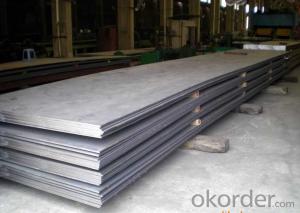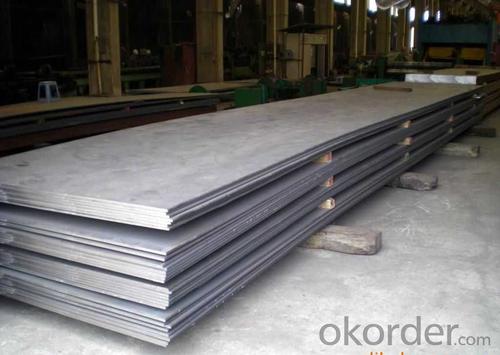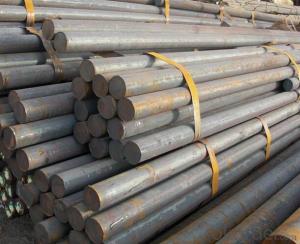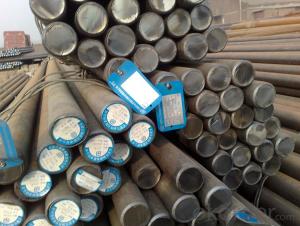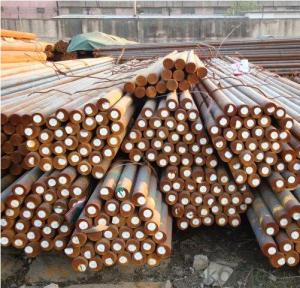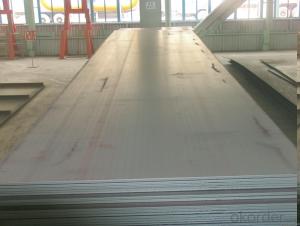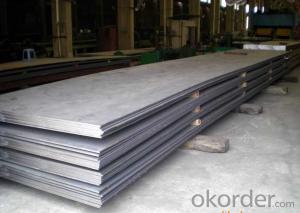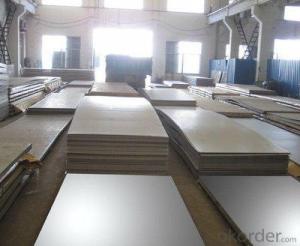1.1645 Alloy Steel Special Steel Steel Plate
- Loading Port:
- China main port
- Payment Terms:
- TT OR LC
- Min Order Qty:
- 25 m.t.
- Supply Capability:
- 10000 m.t./month
OKorder Service Pledge
OKorder Financial Service
You Might Also Like
Specification
Chemical Composition%
| Country | Standard | C | Si | Mn | Cr | S | P |
| China(GB) | T10A | 0.95-1.04 | ≤0.35 | ≤0.40 | - | ≤0.030 | ≤0.030 |
| USA(ASTM) | W110 | 0.95-1.10 | ≤0.35 | ≤0.35 | ≤0.20 | - | - |
| Germany(DIN) | 1.1645 | 1.00-1.10 | 0.10-0.30 | 0.10-0.35 | - | ≤0.030 | ≤0.030 |
| Japan(JIS) | SK105 | 1.00-1.10 | 0.15-0.35 | 0.15-0.50 | ≤0.30 | ≤0.030 | ≤0.030 |
Available Size
| Rolled flat steel | 20-100mm×205-600mm×L |
| Forged flat steel | 110-300mm×400-600mm×L |
Heat Treatment
| Item | Temperature ℃ | Hardness |
| Anneal | 750-760℃ | ≤210HB |
| Quenching | 770-790℃ | 62-64HRC |
| Tempering | 160-250℃ | 58-62HRC |
Characterstics
| 1.Low quenching temperature | ||||||
| 2.Higher hardness and abrasion resistance after heat treatment | ||||||
| 3.poor hardening ability and notable deformation |
Applications: Suitable for cold working dies and plastic moulds with simple shape


1, Your advantages?
professional products inquiry, products knowledge train (for agents), smooth goods delivery, excellent customer solution proposale
2, Test & Certificate?
SGS test is available, customer inspection before shipping is welcome, third party inspection is no problem
3, Payment Terms?
30% TT as deposit and 70% before delivery.
Irrevocable L/C at sight.
4, Trading Terms?
EXW, FOB, CIF, FFR, CNF
6, After-sale Service?
We provides the services and support you need for every step of our cooperation. We're the business partner you can trust.
For any problem, please kindly contact us at any your convenient time.
We'll reply you in our first priority within 24 hours.
- Q: What are the different peening techniques used for special steel?
- There are several peening techniques used for special steel, including shot peening, ultrasonic peening, laser peening, and cavitation peening. Each technique involves using different methods and tools to introduce controlled compressive stresses into the material's surface, improving its mechanical properties and resistance to fatigue, stress corrosion, and other forms of degradation.
- Q: How does special steel contribute to the overall economy?
- There are multiple ways in which special steel contributes to the overall economy. To begin with, special steel finds extensive application in industries such as automotive, construction, energy, and machinery, among others. Its distinct properties and characteristics make it the preferred choice for producing high-performance and durable goods. The demand for special steel not only creates employment opportunities in the steel industry and related sectors but also fuels economic growth. Moreover, the production and export of special steel play a vital role in a country's export earnings, thereby enhancing its trade balance and overall economic performance. Several countries, including China, Japan, and Germany, have greatly benefited from the export of special steel products due to their thriving steel industries. Furthermore, the development and advancement of special steel technologies have a positive impact on innovation and research and development (R&D). Companies in the steel industry invest in R&D to enhance the properties and performance of special steel. This not only results in the creation of new and improved steel alloys but also drives innovation in other industries that rely on special steel products. Additionally, special steel plays a crucial role in infrastructure development as it is extensively used in the construction of bridges, buildings, pipelines, and other critical infrastructure projects. By incorporating special steel, these projects gain durability, safety, and longevity, leading to long-term cost savings. Consequently, this contributes to economic development by promoting sustainable and efficient infrastructure. Lastly, special steel also contributes to the overall economy by fostering a competitive manufacturing sector. Countries with a strong special steel industry possess a competitive advantage across various sectors, as they can manufacture high-quality products more efficiently. This attracts investment, stimulates industrial growth, and enhances overall productivity, ultimately leading to national economic prosperity. In conclusion, special steel contributes to the overall economy through its wide-ranging utilization in diverse industries, its impact on export earnings, its influence on innovation and R&D, its contribution to infrastructure development, and its ability to foster a competitive manufacturing sector.
- Q: What are the properties of leaded steel?
- Leaded steel is a type of steel that contains a small amount of lead, typically between 0.15% to 0.35% by weight. The addition of lead improves the machinability of the steel, making it easier to cut and shape. Leaded steel also has excellent lubricity, reducing friction and wear during machining operations. However, it is important to note that leaded steel may have reduced mechanical properties such as strength and toughness compared to non-leaded steels. Additionally, the presence of lead can have environmental and health implications, so proper handling and disposal measures need to be taken.
- Q: What are the different surface hardening techniques for special steel?
- There are several surface hardening techniques for special steel, including carburizing, nitriding, induction hardening, flame hardening, and laser hardening.
- Q: Can special steel be used in the glass manufacturing industry?
- Yes, special steel can be used in the glass manufacturing industry. It is commonly used for the construction of glass molds and tools due to its high strength and resistance to heat and corrosion. Additionally, special steel can be used in glass manufacturing equipment such as furnace parts and rollers, helping to ensure the quality and efficiency of the glass production process.
- Q: How does special steel contribute to the strength of products?
- Special steel contributes to the strength of products through its unique composition and manufacturing process. By incorporating specific alloys and heat treatments, special steel enhances the material's durability, toughness, and resistance to wear and corrosion. This increased strength allows products made from special steel to withstand higher loads, pressures, and extreme conditions, making them more reliable and long-lasting.
- Q: How does special steel withstand high-velocity impacts?
- Special steel is able to withstand high-velocity impacts due to its exceptional strength and toughness. It is specifically engineered to have enhanced mechanical properties, such as increased hardness and resistance to deformation. This allows the steel to absorb and distribute the energy from the impact, minimizing the risk of fractures or failure. Additionally, special steel may be heat-treated or alloyed with other elements to further improve its impact resistance, making it an ideal choice for applications where high-velocity impacts are a concern.
- Q: How is tool steel used in the manufacturing of molds and dies?
- Tool steel is used in the manufacturing of molds and dies due to its exceptional hardness, wear resistance, and toughness. It allows for the creation of precise and durable molds and dies that can withstand the high pressures and temperatures involved in various manufacturing processes. Tool steel also provides excellent dimensional stability, ensuring the accuracy and consistency of the final products.
- Q: What are the main applications of special steel in the mining processing?
- Special steel is widely used in mining processing due to its exceptional strength, durability, and resistance to harsh environments. The main applications of special steel in mining processing include the manufacturing of mining equipment such as drills, crushers, and grinding mills. Additionally, special steel is used to construct structural components for mine shafts, conveyors, and ore processing plants. Its high tensile strength and corrosion resistance make it ideal for withstanding the demanding conditions encountered in mining operations.
- Q: What are the cutting tools used for machining special steel?
- The cutting tools commonly used for machining special steel include carbide inserts, high-speed steel (HSS) drills, end mills, and broaches. These tools are specifically designed to withstand the high temperatures and hardness of special steels, ensuring precise and efficient cutting operations.
Send your message to us
1.1645 Alloy Steel Special Steel Steel Plate
- Loading Port:
- China main port
- Payment Terms:
- TT OR LC
- Min Order Qty:
- 25 m.t.
- Supply Capability:
- 10000 m.t./month
OKorder Service Pledge
OKorder Financial Service
Similar products
Hot products
Hot Searches
Related keywords
